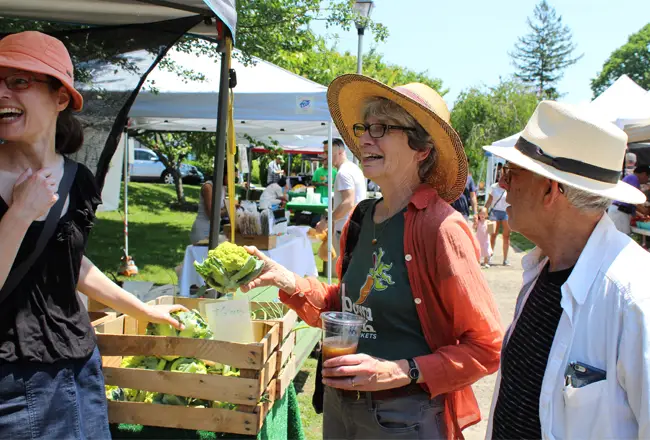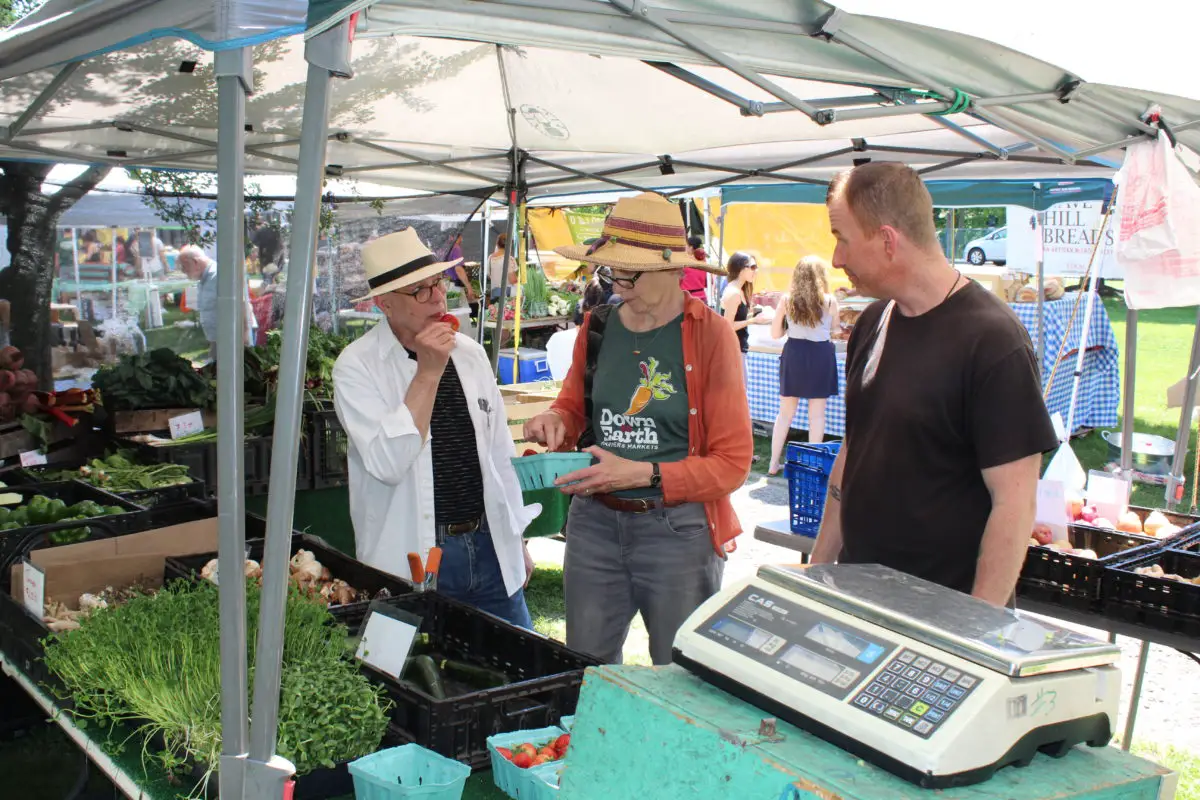
On a Saturday afternoon at Harrison’s newly launched farmers market, a live folk band provided background music as a mix of vendors sold fresh Hudson Valley produce, fish caught off Long Island, meats cured in New Jersey and fresh baked apple pies from a Dutchess County orchard. That scene at the Harrison market marked the latest venture in Westchester County for Down to Earth Markets.
The Ossining-based company celebrated 25 years in business last year. In that time, it has grown from its original Ossining farmers market to managing 20 markets, stretching from Lower Manhattan into Queens and the Bronx, along with Rockland and Westchester counties. The company has launched about 30 farmers markets in the region; some it no longer manages.
The company, which employs about 20 people full and part time, has grown along with the rest of the industry in which it operates. In 1994, there were fewer than 2,000 farmers markets in the country. Last year, the U.S. Department of Agriculture counted 8,600.
“The food movement has changed in the 25 years we’ve run this company,” said Miriam Haas, founder of Down to Earth Markets. “There’s a lot more interest in where you get your food. People like to shop directly from the people who make it.”
Grown in Ossining
The company started out of a desire for Haas to take more control over the food she purchased. In 1990, Haas was concerned enough with reports of pesticide use on apples that she started a food co-op with 15 other families around Ossining.

After that proved difficult to manage, she launched a farmers market instead. Operating under the company name Community Markets, the original Ossining market kicked off in 1991 with just two farmers selling out of a parking lot in Ossining”™s downtown.
There were only two active farmers markets in the county at that time. Both were in the much more densely populated downtowns of Yonkers and New Rochelle.
“At that time, all the farmers went to Manhattan,” Haas said. “They didn’t think that they could make money in the suburbs. So I had to convince them to try it.”
The Ossining market slowly added vendors and gained traction with customers. In the meantime, Down to Earth Markets (though still under the name Community Markets) was spreading its reach in the region. About three years after the Ossining market launched, Haas was contacted by a woman in Brewster looking to start a farmers market. Haas gave her some advice, but the market never came to fruition.
Instead, Haas was later asked to launch the Brewster market, beginning a “kind of a trajectory of starting farmers markets for communities,” Haas said.
 Down to Earth opened its second location in Brewster in 1995. A year later, the company had markets in Pleasantville, Hastings-on-Hudson and restarted a former market across the river in Nyack. Spring Valley opened in 1998; Tarrytown in 2000.
Down to Earth opened its second location in Brewster in 1995. A year later, the company had markets in Pleasantville, Hastings-on-Hudson and restarted a former market across the river in Nyack. Spring Valley opened in 1998; Tarrytown in 2000.
“I went around as a sort of Johnny Appleseed,” Haas said. “I would go to chambers, I would go to towns and villages and give presentations about how farmers markets are great for downtowns.”
Similarly, the company”™s network of vendors grew. Haas attended farmers conferences and the company’s name spread through word of mouth.
“Once they heard that they could drive an hour and a half less and still have a good market, they became very interested,” said Jon Zeltsman, president of Down to Earth.
Zeltsman, Haas”™ husband, joined the company full time in 2000. In 2012, the company officially rebranded as Down to Earth Markets.
“There was nobody else doing what we were doing,” Zeltsman said of the company’s early days. “We were one of the first organizations to actually become a multimarket manager.”
Building the food ecosystem
While the markets are run as a business, it’s a business with a focus beyond the bottom line, as Zeltsman describes it. Down to Earth is a B-Corporation, a certification for companies that work toward solving social and environmental issues.

“It’s about the broader mission beyond profit,” Zeltsman said. “What we consider part of our bottom line, and is part of the B-Corp certification, is what our benefit is to the community.”
For Down to Earth, that vision focuses on creating a strong regional food system, supported by independent farms and local businesses. Haas and Zeltsman pull only from vendors within a reasonable driving distance of their markets. They frequently visit farms to ensure quality, and bring food vendors into a test kitchen at their office for observation.
The company has been able to act as a food incubator in the region, Haas said. Its vendors are often new farms or businesses trying out new products. She said vendors have gone on to be featured in national publications or landed on the shelves of Whole Foods.
“We are showing people that there are other options than just the industrial food system,” Haas said. “So I think we are staying close to our mission of improving the links between the farm and consumer.”





















